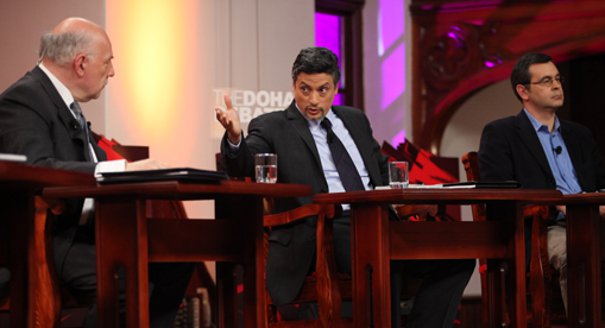Registration
You will receive an email confirming your registration.
With much of the Arab world in chaos, the question of Turkey’s suitability as a model for Arab states in transition is becoming increasingly prominent. Turkey’s seemingly successful blend of Islam and democracy, as well as the country’s steady economic growth, are attractive points in its favor, but questions about respect for human rights norms remain a source of concern.
Recently, the Doha Debates hosted a vote on whether Turkey is an appropriate model for new Arab states. The Doha Debates are a debate series financed by the Qatar Foundation for Education, Science, and Community Development that tackle controversial issues in the Arab world. Ece Temelkuran, an award winning Turkish journalist and author, and Hassan Mneimneh from the German Marshall Fund offered arguments on why Turkey is a bad model for new Arab states, while Carnegie’s Sinan Ülgen and Aboubakr Jamai, an award winning Moroccan journalist and co-editor of the Moroccan news website lakome.com, argued the opposite before a majority Turkish audience. In the end, the audience voted that Arab states should not follow their country’s example.
Highlights:
- Too Many Problems: Temelkuran cited various examples of the government’s crackdown on critics, including journalists, students, and academics. She went on to say that it would not be wise for Arab countries to adopt a system like Turkey’s, since Turkey suffers from too many problems, including a lack of governmental transparency and repression of the opposition.
- Cover for Increased Islamism: Mneimneh warned of the potential for Islamists to use Turkey’s model of governance as a convenient cover to achieve positions of power and entrench themselves as part of the political process in the Arab world.
- Work in Progress: Jamai argued that Turkey’s current non-authoritarian Islamist regime offers a successful model to emulate for many states in the Arab world. While Turkish democracy has its shortcomings, it is a work in progress and therefore offers an example to Arab countries in political transition, Jamai concluded.
- Similar Culture, Similar Model: Ülgen stressed that for reasons of geographic proximity, culture, religion, and tradition, the Turkish model has relevance for the Arab world. He explained that it is important to listen to what Arabs are saying in public opinion polls. In a recent poll, when Egyptians were asked to choose between the French, Saudi, and Turkish models of governance, Turkey was the resounding choice.
